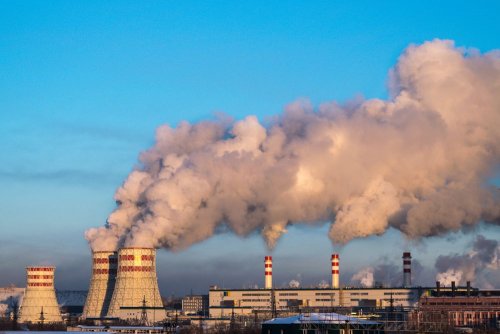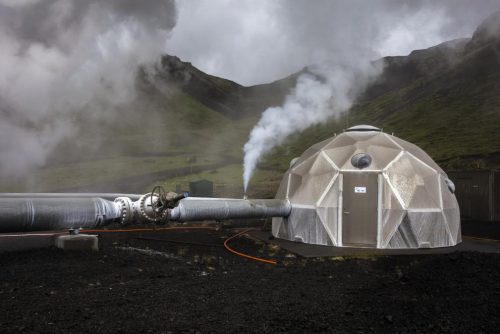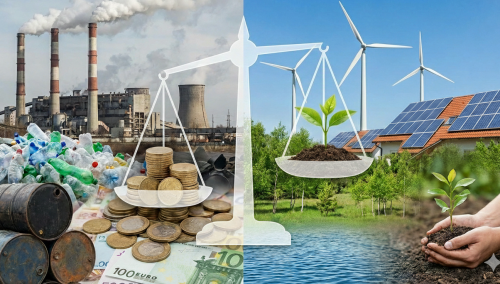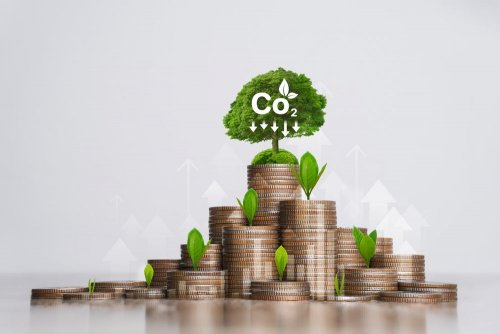The Fund for Decarbonization and Energy Efficient Transformation has been replenished by more than a billion hryvnias in five months. Another $350 thousand is provided by UNDP in Ukraine. However, the Decarbonization Fund cannot currently dispose of the money. EcoPolitic investigated why.
Tasks of the Decarbonization Fund
To make the Ukrainian economy decarbonize faster, the Cabinet of Ministers created the State Fund for Decarbonization and Energy Efficient Transformation. The name speaks for itself: raising and using money to transition from a carbon-based economy to a carbon-neutral one. It is also about reformatting the energy sector, where modern and efficient technologies replace outdated energy-intensive ones.
The creation of the Decarbonization Fund in 2020 was initiated by Olha Buslavets, former head of the Ministry of Energy of Ukraine. She said that the fund was created according to the best international practices.
"The fund was supposed to be filled with a portion of the carbon tax. This mechanism was taken from the experience of Denmark and 18 leading countries that used the CO2 tax exclusively for decarbonization measures. With the support of the Ukrainian-Danish Energy Center, a draft law was developed to establish the Decarbonization Fund at the legislative level," Buslavets said.
The fund was supposed to appear in 2021, but officially became operational on January 1 of this year. Fund funds will be spent on the following activities:
- financing of energy efficiency projects;
- reduction of greenhouse gas emissions;
- increasing the share of renewable energy sources;
- compensation of expenses to persons who spent money on energy-efficient measures;
- payment of public debts for loans for energy-efficient modernization.
With the launch of the Decarbonization Fund in Ukraine, the "polluter pays" principle should come into effect. This means that the environmental tax for emissions of greenhouse gases into the atmosphere will not go to the general budget of the state, but will be directed to the implementation of decarbonization measures.
The money was received – it is impossible to spend it
The Ministry of Finance of Ukraine reported that as of June 5, 2024, revenues to the Decarbonization Fund from the payment of environmental tax amounted to UAH 1.1 billion.
However, it is currently impossible to use the funds. The Fund cannot dispose of the money due to the lack of a regulatory framework.
"Initial steps have been taken, but the Decarbonization Fund is not yet fully operational. An important step for the full operation of the Fund was to adopt acts of the Cabinet of Ministers. They should have defined the procedure for using the funds, a full list of measures and requirements for them, and approved targeted programs," said Olha Buslavets.
Tamara Burenko, Deputy Director of the Department of Strategic Development at the State Agency on Energy Efficiency and Energy Saving, also noted that the necessary documents for the Fund's full-fledged work are currently missing.
"The Decarbonization Fund does not yet have bylaws, so there is nothing to talk about yet. The regulations are currently under consideration by the Cabinet of Ministers. No one knows when the government will consider it and which version will be approved," Burenko said.
Back in April, the Ministry of Infrastructure and the State Agency on Energy Efficiency and Energy Saving jointly developed and sent to the Government for approval a draft resolution "On Approval of the Procedure for the Use of the State Fund for Decarbonization and Energy Efficient Transformation." The Secretariat of the Cabinet of Ministers reported that the document is "being processed in accordance with the established procedure in accordance with the regulatory requirements." The Cabinet of Ministers did not say when the draft would be approved or sent for revision.
In May, the State Agency on Energy Efficiency and Energy Saving signed an agreement with the UNDP in Ukraine. According to the agreement, the Decarbonization Fund will receive up to $350 thousand in non-repayable financial assistance.
"At least 80% of these funds are allocated to support loans for energy service companies, which should significantly strengthen Ukraine's decarbonization efforts," the agency said.
In addition, UNDP in Ukraine provides institutional support to the fund, involving financial, legal and technical experts. It includes monitoring and control to ensure compliance with sustainability, transparency and efficiency standards.
"The Fund is currently in its early stages, with governmental procedures, project selection mechanisms and performance criteria being finalized. The first successes can be assessed in late 2024 – early 2025, which will allow us to understand the effectiveness and impact on reducing CO2 emissions," UNDP Ukraine commented.
Decarbonization on the ground
In order to accelerate environmental modernization, the State Energy Efficiency Agency opens regional offices. The first one was opened in November last year in the Dnipropetrovsk region. As of today, there are already several such decarbonization offices. However, the work of these institutions is limited to providing consultations.
Kharkiv office of decarbonization
At the end of February this year, the State Agency on Energy Efficiency and Energy Saving of Ukraine together with the Kharkiv Regional State Administration opened a regional office for decarbonization and energy efficiency in Kharkiv region.
"We will provide financial and state support, which will start in April this year," said Hanna Zamazeyeva during the opening of the office.
As of today, the Kharkiv Regional State Administration does not have information about the projects implemented by the office and how much money was allocated to the office. Instead, the Kharkiv Regional Council reported that the office did not receive funds from the budget or other sources of funding.
"Given that the Office is an advisory body, it is not currently directly attracting investments," the Kharkiv Regional Council said.
Dnipropetrovsk decarbonization office
The institution in Dnipropetrovsk region was opened in November last year. During the opening, officials of the State Energy Efficiency Agency and Dnipropetrovsk OVA signed a memorandum of cooperation on the basis of the mentioned office.
In June, the Dnipropetrovsk OVA reported that there was no information about the office's activities in the administration. And what about the memorandum of cooperation?
The reaction of the eco-community
Lyudmyla Tsyhanok, President of the Association of Environmental Professionals (PAEW), emphasized that only existing programs will ensure decarbonization and energy efficiency.
"Incentive programs are important, not nice promises and the number of new offices created. The absence of clear mechanisms at the time of the Fund's launch is a matter of justified concern," commented Tsyganok.
Anar Rafiyev, President of the Ukrainian Energy Efficiency and Energy Saving Fund, notes that the Fund lacks transparency.
"On the one hand, it can be noted that the fund has clearly defined goals and objectives. On the other hand, not all projects are transparent and accessible to the public. It is important to ensure the transparency of the fund's activities, improve the mechanisms for monitoring and evaluating performance. The prospects of the Decarbonization Fund depend on its ability to solve the above problems," Rafiyev said.
Yuriy Maslov, Chairman of the Board of the NGO "Alliance for the Restoration of Ukraine", noted that due to the military aggression of the Russian Federation, the fullness of the Decarbonization Fund does not reach 1% of the annual need.
"This fund can become a powerful mechanism for decarbonizing Ukraine's industry. The issue of decarbonization needs to be addressed today. Sectoral development funds in accordance with European climate legislation can solve the problem of lack of project funding. Such funds, combined with grant and technical assistance, and the climate transformation of enterprises, will be an effective mechanism to support Ukraine's European integration course," Maslov said.
Ministries are divided – where does the fund go?
In May, Ukrainian officials began to talk about the Ministry of Community, Territorial and Infrastructure Development being split into two separate agencies. The government fired the head of the Ministry of Infrastructure, Oleksandr Kubrakov, and his deputies. MPs began spreading theories about who would head the ministry and the "newly created" Ministry of Regional Development as a result of the split.
More than a month has passed since Oleksandr Kubrakov's dismissal, and no new ministers have been appointed to the Ministry of Infrastructure and the Ministry of Regional Development. In addition, the State Agency for the Reconstruction of Ukraine is without a head.
How will this turbulence in the Government affect the work of the Decarbonization Fund? Ministries without heads and blocking of restoration projects will obviously not contribute to the effective work of the Fund.
Money from climate funds
Due to the military aggression of the Russian Federation, production in Ukraine has declined: some enterprises are not operating at full capacity, and some have been destroyed. Therefore, the amount of money that will go to the Decarbonization Fund depends on the capacity of Ukrainian enterprises. And at the same time, the scale of financing for environmental modernization.
If the economy falls, the government could focus on attracting investments from global climate funds. There is money there and it is being actively used to implement decarbonization programs. The European Union countries are carrying out ecological modernization of production in general with the help of EU grants. Hundreds of millions of euros are allocated for the green modernization of industrial giants. Once a year, the EU Innovation Fund holds competitions for large and small projects that offer breakthrough solutions to the implementation of low-carbon technologies. Such projects receive money and are implemented.
The Ukrainian Decarbonization Fund can become a platform for attracting millions of euros from European trust funds. Moreover, the fund's activities include targeted grants and loans. In addition, climate trust funds are ready to provide money and do so.
However, the Government has not made any borrowings for replenishment this year. The Ukrainian Decarbonization Fund has not received any grants. The attraction of non-repayable funds in the form of grants for economic modernization has been postponed until the government determines its personnel and priorities. It is currently unknown when this will happen.





